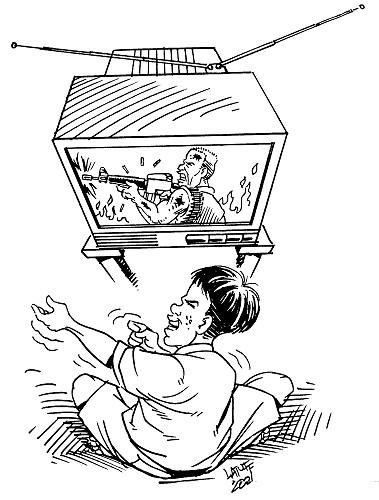 Another response to The Evidence Against Media Violence:
Another response to The Evidence Against Media Violence: Another response to The Evidence Against Media Violence:
Another response to The Evidence Against Media Violence:
Jennifer,
>> I am not sure if you are the right contact but I was doing some homework and I came across the following argument <<
I'm the right person!
>> Rates of vandalism and threats with or without a weapon actually decreased during the 1990's (U.S. Department of Education, 1999) <<
Vandalism and threats are hardly the totality of violent crimes.
Maybe media violence decreased during that period also. It's hard to tell since there's no clearcut measure of it.
Even if crime rates decreased, they could be higher than they would've been if the media hadn't been so violent. It's almost impossible to determine anything by looking at a few statistics in isolation.
The larger issue is the trend over several decades. Media violence is way up since the 1950s and '60s and so is real-world violence. Is that a coincidence, or is media violence a contributing factor, as studies have indicated?
Almost everything I've posted suggests that media violence tends to increase people's aggression, of which violence is only the worst manifestation. Therefore, crime rates are a poor indicator of the possible effects of media violence. Aggression can show up in many non-criminal ways.
Rap songs, competitive reality shows, and calls for revenge against foreigners are just a few examples. Can you prove aggression (not crime or violence) has decreased recently?
>> That statement I just made brings me to ask myself, well what about the children and others whom we don't have control over, we can't tell other parents to not let there children watch violent movies or play violent video games. <<
Exactly. I can't "choose" to let someone else's children not watch violent shows or play violent games. Yet I and all of society suffer the consequences if those children become aggressive or violent.
>> We want to be able to have the freedom and choice to say and do what ever we want but yet we get mad and want to run and change policies when someone does something we don't like. <<
Since it's a free country, we're free to advocate policy changes whenever we like. If the majority agrees with these changes and the Constitution doesn't forbid them, we win.
>> Before we focus on media and filmmakers as the source of violence we should look at ourselves, our parenting styles, our government, power, money, inequality, greed, domestic violence, and our social institutions that shape our young ones. <<
We can focus on all these factors simultaneously. We don't have to focus on some of them before others.
>> You also state "They've found that parenting is just one of many influences on a child". I would like to correct you, not only have they found that parenting is just one of the many influences on a child but that the family as a social institution is the most important influence on a child. <<
Part of good parenting is controlling access to bad media and ameliorating its effects. So "parenting" and "media" are interrelated rather than unrelated factors.

Parents, not films?
>> "Parents, school, and peers shape children from their earliest days, not films" (Oliver Stone 1995). <<
Considering Stone makes violent and controversial films, this is a self-serving statement. Besides, being a filmmaker doesn't make him a media-violence expert anymore than being a farmer makes one a nutritional expert. I probably know more on the subject than he does.
Stone's claim about parents vs. "films" is a false dichotomy since most children watch TV and videos, not films. Studies have shown kids are watching more TV at an earlier age these days. By the time they go to school and develop peers, they've been watching the tube for thousands of hours. And as noted below, even nonviolent TV has negative effects.
Watching TV 'is bad for children'
Children under two should not be allowed to watch any TV, experts say.
Each hour in front of the TV increased a child's chances of attention deficit disorder by 10%, their research in the Pediatrics journal showed.
The youngsters who watched the most television were more likely to rank within the top 10% for concentration problems, impulsiveness, restlessness and being easily confused.
>> Many people don't agree with gay and lesbian marriages -- some think that it can cause damage to a child that grows up in this type of family setting. <<
No need to guess on that point, since research can prove it one way or another. Just as it's done in the case of media violence.
>> So, lets not gays and lesbians get married because they could possibly indirectly cause a kid to have mental damage. Obviously that is ridiculous. <<
Right!
>> Personally I support gay and lesbian marriages, anyone who wants to show their love to another should have that choice. But I also support the arts and entertainment in how ever they choose to express themselves. <<
If one could demonstrate that gay marriages cause harm, I might agree that we should ban them. Since unmarried gay couples can adopt children, you'd have to prove that the institution of marriage caused some harm that cohabitation didn't. Good luck proving that.
This proof obviously doesn't exist. In contrast, the evidence on media violence is substantial enough to constitute "proof." Yet I'm not advocating that we ban anything.
But I'm also not supporting entertainment producers no matter how they choose to express themselves. If they want to produce violent entertainment, I'll feel free to criticize them. It's a free country, after all. If they don't like the criticism, they can leave.
>> I am a 26year old female and don't have a mean bone in my body but I really enjoy playing games like Grand Theft Auto and Resident Evil. I enjoy watching all types of films including ones with much violence. <<
How do I know you don't have a mean bone in your body? Did you oppose the war in Iraq? In Afghanistan? A true pacifist would've opposed both.
>> "Yet as with human infants, we can never know the outcome of nascent art, and so both must be protected and nurtured, precisely for society's sake. For it is only a small step from silencing art to silencing artists, and then to silencing those who support them, and so on, until, while we may one day live in a lawyer's paradise, we will surely find ourselves in a human hell." (Oliver Stone, 1995) <<
More self-serving quotes. How about broadcasting snuff films on network TV, if you literally don't believe in limits? How about showing 9/11, with people jumping to their deaths, in a continuous loop? All terrorism, all the time.
If that's too painful for Americans, well, too bad. It's art! The First Amendment protects it, right?


More important problems than media?
>> Again, I just wanted to share my opinion. Again you are obviously a very intelligent person. I can also see that you are very passionate about the media violence issue in our society. My intention here is not to step on toes just to open minds. <<
My mind is open. I've come to my tentative conclusions only after reading the voluminous evidence that supports my position. If you can read the same evidence and ignore it, I'd say your mind is less open than mine is.
>> Maybe, instead of trying to silence art and artists, someone of your intelligence and passion should try to help much more needed causes like the homeless and other poverty stricken people. <<
One can link the effects of media to almost every aspect of our culture. For instance, I could easily argue that we've undertaken the "war on terror" because our media has taught us a superficial "us vs. them" mentality, with us as the good guys and dark-skinned foreigners as the bad guys. If the media had given us a broader, more informed, less stereotypical picture of the world, we might not have needed to send hundreds of US soldiers and thousands of Muslim civilians to their deaths. Instead of spending trillions on armaments to defeat nonexistent threats, we might have spent that money to encourage democracy and human rights in the Middle East and elsewhere. Then 9/11 might not have happened and we'd all be a lot happier.
Read Culture and Comics Need Multicultural Perspective 2000. I make the case that our actions are linked to beliefs, which are linked to our perceptions. The media is instrumental in shaping these beliefs and perceptions. So addressing the media and its effects is instrumental in bringing about change.
We'll never "cure" a problem like homelessness or poverty until we first see it and believe it's a problem. Right now, many Americans think poor and homeless people are responsible for their own plights. If they only tried, these Americans claim, they could pull themselves up by their bootstraps. (It's your classic "blame the victim" mentality.)
Until Americans undergo a paradigm shift, begin to see problems from something other than their selfish perspective, no external "solution" will solve a problem like poverty. In fact, Americans won't even try to solve it until they believe it's something they need to solve. By working for a multicultural perspective, therefore, I am dealing with problems such as poverty. I'll argue that my way is the best and perhaps only way to deal with them.
>> "There are approximately 6.7 million families in the US living at or below the official poverty line, and 9.3 million living at or below 125 percent of the poverty line" (Statistical Abstract, 2001). <<
Yes...so? What solution do you propose to address this problem? What solution does our current "leadership" (George W. Bush and the Republican Congress) propose? More tax cuts for the rich? Fewer civil rights? More preemptive wars?
If Bush and company have a plan to address the nation's poverty, I haven't heard it. I don't think he and his half of America even care about poverty. So again, until we shift the nation's hearts and minds to recognize this problem and feel its urgency, nothing's going to happen.
>> The things that go on in this country make me want to vomit sometimes. The thing that gets me the most is that we all fight and argue with each other over really stupid shit, there is no WE in I in this country. <<
So stop fighting with me and start agreeing with me. <g> I know what to do and our fearless (mis)leaders don't.

Why ethnic parades?
>> It's like we are all out for ourselves and we want to be equal but yet we really don't.
Like I don't understand why gays and lesbians, and blacks want their own parades. <<
Probably because President's Day, St. Patrick's Day, July 4th, Columbus Day, and Thanksgiving all celebrate the achievements of America's white, Anglo-Saxon Protestant elites.
>> Why can't we just have a parade were we all get together and celebrate being human. <<
I'm willing to eliminate these holidays and their parades if you are. <g>
St. Patrick's Day is the biggest and most ethnic holiday in America these days. I haven't heard anyone who wants to celebrate "being human" call for its elimination. Go ahead...you can be the first.
As another example, it's taken about 150 years for Americans to realize Indians were equal participants in the first Thanksgiving. Until recently, we celebrated the Pilgrims as if they were the only actors in early American history. In fact, the Indians' role was absolutely essential; without them, the Pilgrims would've died. The Indians, not the Pilgrims, were arguably the key players in this story.
Now that the Indians have achieved some measure of recognition during Thanksgiving, you want to eliminate ethnicity and just celebrate "being human"? Where were you the last 150 years? If your history had been ignored like the Indians' history had been, I bet you'd want to see it recognized. It would be your turn to finally shine.
Alas, you're thinking just like the typical Anglo-American. We've recognized the achievements of you and your ancestors throughout the country's history. Now that we're recognizing someone else's achievements, suddenly you don't like it. Does that about sum it up? <g>
>> Black women want their own Miss Black America Pageant but don't want whites to be a part of it. I just don't get it! <<
See Outside the So-Called Ethnic Box for similar thoughts. Maybe you'll get it after reading these postings.
>> And since this country is such a depressing shitty rat race we need things like movies, cartoons, and video games in order to escape from this reality we live in. <<
Do we? Then let's have works that enlighten and inspire us, rather than works that feed our feelings of cynicism and impotence.
>> We shouldn't be arguing with each other, we should be arguing with our political institutions so that we can all have equality, more money for schools, and the likes. Crazy greedy people and organizations like Bush, his buddies, Enron, and Martha Stewart have the power not regular folks. <<
I agree. But who's arguing? Not me. I'm just reporting what the evidence says.
Rob Schmidt
Publisher
PEACE PARTY
|
. . . |

|
All material © copyright its original owners, except where noted.
Original text and pictures © copyright 2007 by Robert Schmidt.
Copyrighted material is posted under the Fair Use provision of the Copyright Act,
which allows copying for nonprofit educational uses including criticism and commentary.
Comments sent to the publisher become the property of Blue Corn Comics
and may be used in other postings without permission.